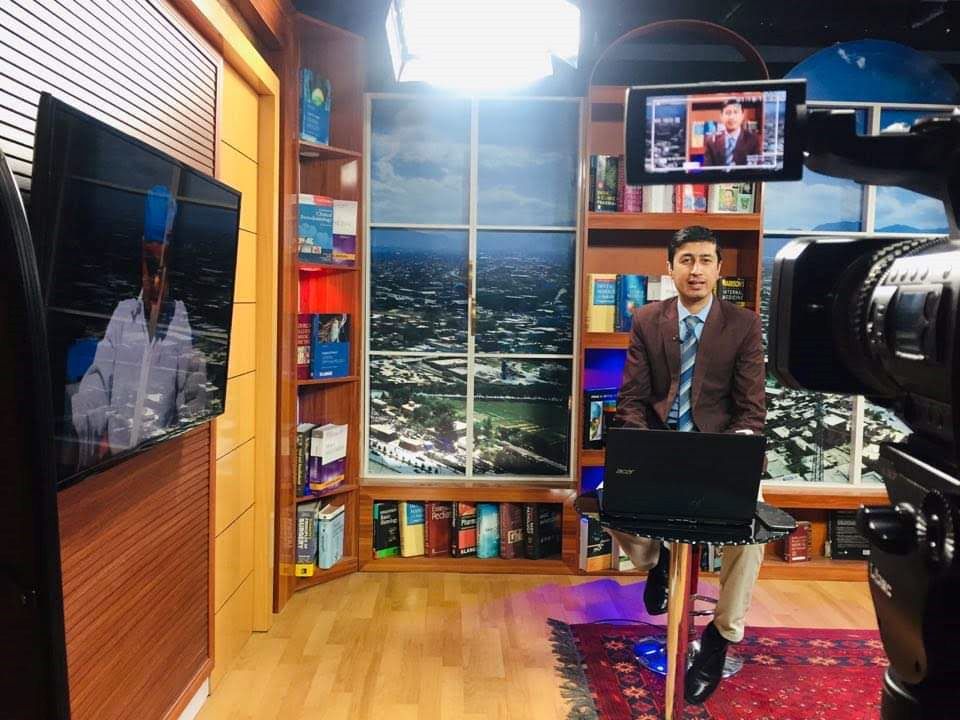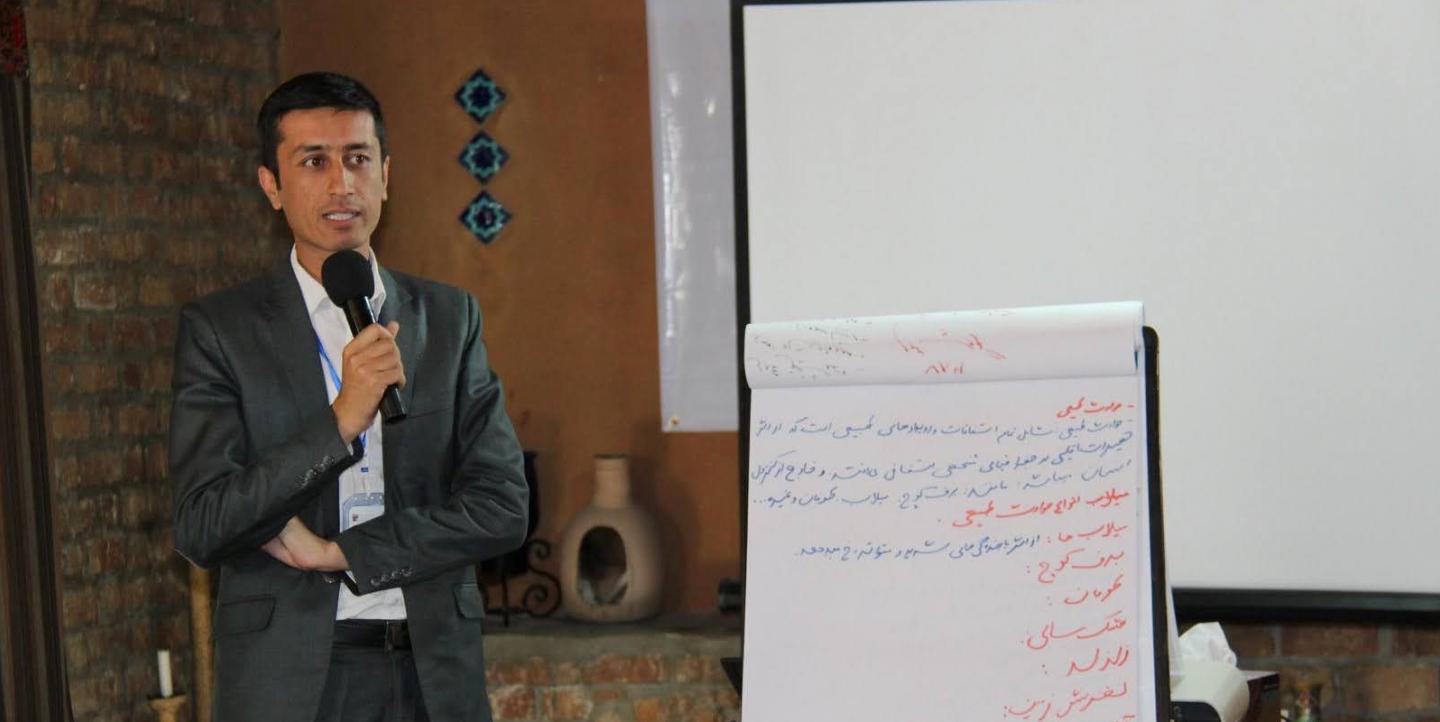A country of complex geography and a variety of ethnicities, some of which have clashed at times, Afghanistan has been grappling with foreign intervention, insecurity and instability for decades. The country’s political turbulence and economic uncertainty have often plagued civilians’ daily lives with conflict, and since August of 2021, oppression.
Journalist Navid Hameedi, born in 1985, grew up amid this constant conflict in his native Afghanistan. He entered the world of professional journalism when he was 19 years old – the same year he began learning some basics of the trade, using resources on the BBC and the South Asia Free Media Association, among others.
Working as a research assistant in a newsroom early in his career, Hameedi’s interest in journalism led him to news gathering at a magazine that shut down not too long afterward. He got his start in writing afterward, as a freelancer contributing to multiple publications in Kabul.
He eventually became the executive editor of one of these publications before it closed in 2007; a decision he says was made out of an abundance of caution, amid security concerns. A decade later, in 2017, Hameedi graduated with a bachelor's degree in development studies from the University of Afghanistan, which he said has advanced his work in journalism.
In 2017, Hameedi launched a TV channel named Cheragh focused on health and medical issues, hospitals, and seasonal diseases and conditions in Afghanistan. He said the channel, which reached many inside Afghanistan, particularly in rural areas, was closed after the Taliban took control of the country in 2021.
I spoke with Hameedi about journalism in Afghanistan, his career as a reporter, and how he has benefited from IJNet.
Can you describe your experience as a journalist and media entrepreneur?
My work first appeared in Mandegar, Rah-e Madaniyat and 8am dailies. I also wrote for the website, Kabul Press.
I started entrepreneurship in 2009, when I established a journalism learning center named the Blue Journalism Institute. The center helped train journalists and familiarize the public with issues such as cyber security and internet addiction.
In exile, I launched a health-focused television channel with a few colleagues as we felt the critical need for advancing general knowledge about health in the country. Establishing the television channel was a vessel for me to become a member of the Afghan Eco Journalists Network [Mediothek Afghanistan], supported by the Heinrich-Böll-Stiftung organization.
In 2014, I won a fellowship at an Afghan civic engagement program. [The fellowship was] for working on a journalism project to combat government corruption in Afghanistan, with the help of a social media campaign I started.
Why and how did you leave Afghanistan?
After the Taliban’s return to power in August 2021, civic and media organizations, universities, and even major commercial activities were silenced and on the brink of collapse. Out of fear for my life and safety, I moved from the Kabul neighborhood I lived in and started living covertly. I managed to leave Afghanistan in early 2022.
Throughout the process, IJNet, the International Center for Journalists, the Committee to Protect Journalists and Freedom House helped me tremendously, and I am thankful to them all.

How did you come to know about IJNet, and how long have you been following its content?
In 2022, when I started living in exile, I felt I had lost everything. I was unemployed; no independent publication or any form of independent media existed in my country any longer, and there was no outlet I could write for.
A journalist friend introduced me to IJNet Persian. I started reading the website’s articles and found them highly informative and useful. When I read that IJNet Persian accepts freelance submissions, I reached out, and soon after, I started contributing to the website. My first articles were a far cry from IJNet’s writing standards, but the editor worked on the articles and patiently helped me advance my writing skills.
IJNet Persian has been encouraging me and other Afghan journalists to contribute to the website, which has increasingly become a popular outlet for Afghan journalists.
Have you and your colleagues taken advantage of any IJNet opportunities?
I register and participate in most of the webinars promoted on IJNet, and have applied to a number of fellowships and competitive opportunities. After my article on fact-checking and verification was published on IJNet Persian, a group of Afghan journalists committed to founding an Afghan-focused fact-checking website. [Note: this site is not yet active.]
Under the Taliban, YouTube channels have grown rapidly in Afghanistan, without any standard or principle. I wrote a story for IJNet Persian about this issue and its negative consequences. After the story was published, a group of Afghan YouTube content creators decided to establish a society to implement regulations for the process of creating content. They have invited me to be an advisor on their board. The society will soon open an office, as its permit has already been issued by the government.
Other Afghanistan-focused IJNet stories have been noticed by Nai SOMA, the institution supporting independent media in Afghanistan, whose activities have recently been restricted by the Taliban government.
How has IJNet Persian helped you professionally?
In my country’s current conditions, IJNet has been the sole effective platform as we Afghan journalists grapple with the issues we are facing amid the demise of Afghanistan’s independent media. I wanted to work and keep writing in hopes of enlightening interested audiences, but I could not have done so without IJNet. Continuing to work was crucial to me, both because I was a journalist and because I needed an income to make ends meet. IJNet was the only outlet that made all that possible for me.
Moreover, I have learned that IJNet is followed widely and has a large number of readers. I think if independent Afghan journalists continue to write for IJNet, we could advance journalism discourse in Afghan media circles inside and out of Afghanistan. Being one of its kind, IJNet has rapidly become popular among young Persian-speaking journalists around the world.
Would you like to contribute to IJNet Persian? If so, don’t hesitate to reach out to us with your pitches at persianeditor@icfj.org.
Photos courtesy of Navid Hameedi.
This article was updated on April 1, 2024.


